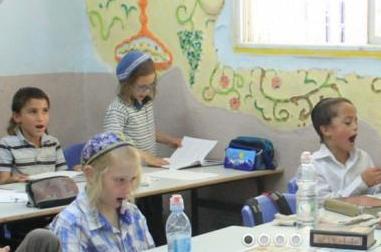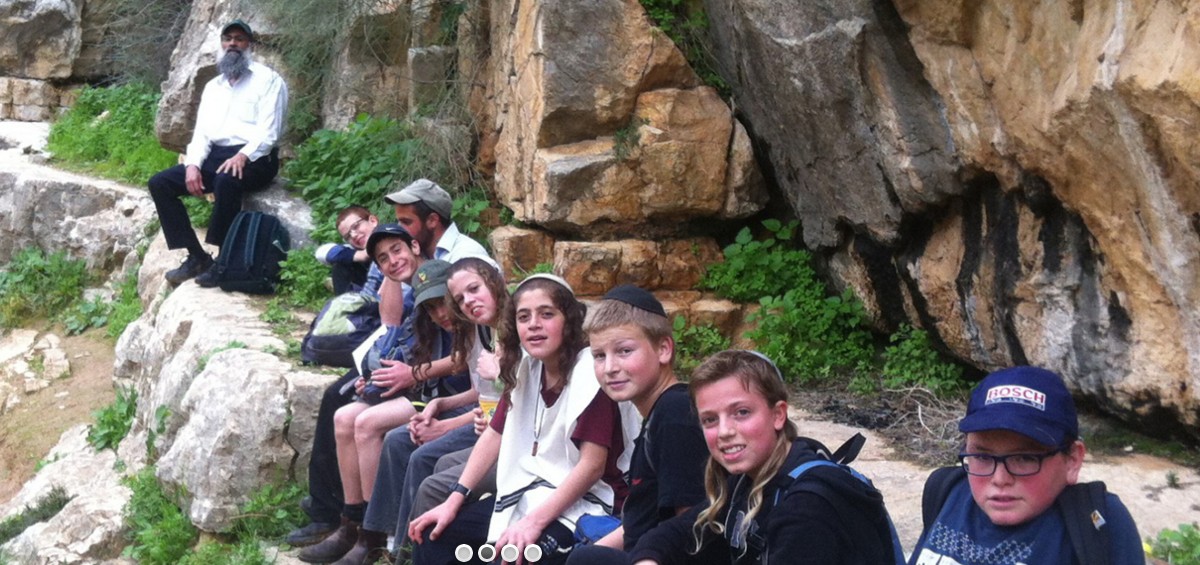"The Talmud Torah Strengthens the Community Spirit of Baalei Teshuva"
Talmud Torah 'Divrei Yechezkel' was established by baalei teshuva for baalei teshuva families. What makes this institution unique, how does it differ from classic Talmud Torahs, and how does it unify those wearing all types of kippot under one roof?

How many schools do you know that operate out of a chicken coop?
Here is one: Talmud Torah 'Divrei Yechezkel' in the Moshav Beit Meir.
Talmud Torah Divrei Yechezkel was established about 12 years ago by the "Torani Community Beit Meir Association" to cater to baalei teshuva families. The association was led by Dr. Ohad Heilperin, a doctor by profession and a baal teshuva, who could not find a school to his liking for his children. While there were plenty of religious and Charedi institutions, Dr. Heilperin believed that children of baalei teshuva needed an institution that did not yet exist—one that understood their unique life realities. The result: he opened a Talmud Torah in the attic of his house—with only four students. Gradually, more students joined, and the attic became too cramped for them. The solution was provided by an abandoned coop in the backyard: it was renovated and adapted to serve as a Talmud Torah building.

The Talmud Torah building might have once housed chickens, but at 'Divrei Yechezkel,' the focus is very much on the education of people. "We educate for love of Torah and love of Israel, without distinctions of sects or origins," says Rabbi Ilan Bourla, the educational director of the institution. "The Talmud Torah was initially established for children from baalei teshuva families. Here, there are kippot of all colors, no tribalism, no 'negative unit pride...' There's no second class here. We have students whose fathers are learners, and students whose fathers are workers. Everyone is loved, everyone is holy."
Why do baalei teshuva need their own institution? At 'Divrei Yechezkel,' they emphasize that they are not criticizing the traditional Charedi Talmud Torahs. "There is no doubt that their methods suit them. But it's impossible to ignore the fact that half of the dropouts in the Charedi community are the children of baalei teshuva. Charedi educational methods are simply not always suitable for baalei teshuva families. For example, most baalei teshuva are individualistic by nature: it's what led them to make a drastic life change. But this quality is often handed down to their children, who consequently do not like rigid frameworks. For instance, in many Charedi Talmud Torahs, there should be no difference between institutional policy and family behavior. And if there is such a difference? The child learns to lie about it... This doesn't happen with us. There is a lot of awareness and sensitivity to what happens within families. There was even a time when we had a student whose mother didn't cover her head. The father returned to religion, the mother did not, and we understood the complexity and didn't pressure the family."

In addition to Dr. Heilperin and Rabbi Bourla, the staff includes Rabbi Yehuda Leib Frosh, who has been advising the institution and parents for many years, and Moti Zulberg, the educational advisor. "The educators are often veteran baalei teshuva or second generation baalei teshuva. The rest may come from Charedi homes but have experience and ties to the world of baalei teshuva," explains Rabbi Bourla.
Like every Talmud Torah, the team aims to educate children in Torah and good deeds. But the methods employed here—you probably won't find in every Talmud Torah. The classes are small: they ensure no more than 16 students per class. The education is done not through talks about reward and punishment but through the act itself and the feelings accompanying it—as well as the natural outcomes. Alongside many religious studies, they also learn secular studies at a high level. ("Nine hours a week," says Rabbi Bourla. "We cover all the education ministry's requirements in these hours due to the small classes.") They go on trips monthly, and twice a week, there are afternoon extracurricular activities like sports, swimming, and art.
The true uniqueness, however, lies in the human relations prevailing at the Talmud Torah. In an institution where every kippah is accepted by the administration and a working father or a father who travels to Uman is as common as classic learning fathers, the strong emphasis is on warm, familial relationships: between teachers and students, staff and parents, and among the students themselves. "This is how we strengthen the community spirit, which is often lacking for baalei teshuva," explains Rabbi Bourla.

Where do the students continue after finishing the Talmud Torah?
"Each one continues to a yeshiva that suits him and his family. Some continue to classic Charedi yeshivas, and some opt for yeshiva high schools."
What are your future plans?
"Recently, we understood that in order to continue to grow, we need to step out of the incubator... We opened kindergartens in Mevasseret Zion, and with Hashem's help, in the near future the entire Talmud Torah will move to Mevasseret.
In the more distant future, we dream of opening a yeshiva in a similar spirit—one that is initially suited for baalei teshuva families."

